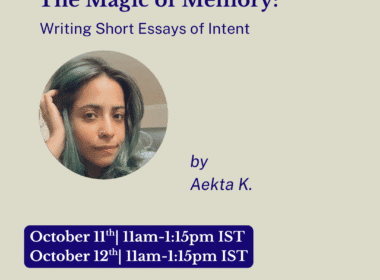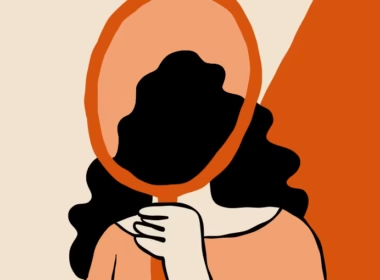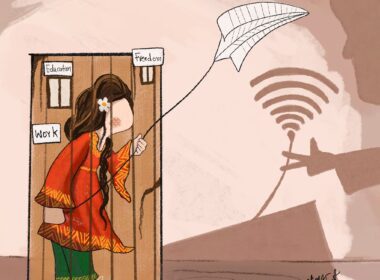Editor's Note
By Shikha S. Lamba
When Usawa first invited me to step in as guest editor and curator for a special Matchbox issue, WE ARE HERE, amplifying Afghan women’s voices, I found myself wrestling with a little doubt. Was I truly the right person for this role? I have to admit, a part of me wished to see an Afghan woman at the helm of this project.
My six years as a magazine editor and four years of activism for Afghan women and children gave me some confidence to bring this together, but I soon realised what truly qualified me for this was something deeper. A few years ago, three Afghan women – one real and two born from fiction – reshaped the course of my life with the force of their voices.
In the year that followed that experience, I spoke widely and passionately about Zeba from A House Without Windows, Rahima from The Pearl that Broke its Shell, and their remarkable creator, author Nadia Hashimi. I never imagined then, that the hard-hitting, soul-stirring, devastating, fictional tales would soon reflect the realities faced by real women in Afghanistan.
I never could have foreseen that, over the next four years, I would step into the role of an activist, raising vital funds for Afghan women and children, shining a light on their lives under Taliban rule. I did not expect the deep friendships I’ve forged with Afghans both within the country and across the diaspora – or the bridges I would build, connecting my communities in Hong Kong and India, with those in Afghanistan.
Nowhere in the world today are women’s voices being so brutally silenced and threatened as they are in Afghanistan. The terrorist regime’s numerous edicts are designed to completely take away basic human rights, remove Afghan women from society, and crush any sense of sisterhood. This gender apartheid, isn’t just an assault on Afghan women; it is a threat to every society still wrestling with misogyny, toxic patriarchy, and religious extremism.
My friendships and associations these past four years have taught me a great deal, but most importantly, this: that true solidarity with Afghan women begins by truly listening to them. This issue of Usawa Matchbox shares the voices of thirty-seven Afghan women and girls: nineteen live in Afghanistan, four are in exile, nine migrated as refugees after the Taliban takeover, and five are from the Afghan diaspora. Among them are authors, activists, artists, a dentist, an ex-ambassador, teachers, university students, small business owners, school students, a film-maker, writers, a paediatrician, an office manager, a mental health professional, media producer and a magazine editor. Their voices include an internationally best-selling Afghan author, one of Afghanistan’s most renowned poets, a Fulbright scholar, and girls from an orphanage. These thirty-seven voices offer you a glimpse of Afghan women’s life experiences. Through them you will get to witness their hopes and dreams, their grief and anger, and their remarkable strength to endure and rise in the face of the unimaginable.
Regarding the submission process, the pieces have undergone only minor edits to ensure that the writers’ true voices and intentions are preserved. I want you to hear them in their own words, unfiltered and unpolished, for a literary audience or native English speakers. Many of the submissions were originally written in Farsi and then translated into English. My online conversations with a couple of writers were only possible thanks to Google Translate, since they speak and write only in Farsi, though some of the contributors are fluent in two or more languages. Some writers were migrating between countries during this process, and submitted their work despite their unpredictable circumstances. A few submissions came in through Usawa’s website, while others were submitted by email. Some submissions also reached me via WhatsApp and my social media. We set aside the usual submission rules and simply welcomed the submissions, however they arrived.
There is a great and urgent need to amplify Afghan women’s voices globally; we need every platform to rise to the occasion. I am grateful to Usawa, and congratulate them for setting a powerful example for literary publications and journals everywhere. Afghan women are not only resisting the Taliban but also challenging the might of global powers that have enabled this oppressive regime. Their fight for freedom is a shared responsibility. The only way to ensure a more equitable and just world is – together.
I would like to extend my thanks to the Usawa team and the following people –
Smita Sahay, Editor in Chief of Usawa Literary Magazine
Wida Danishjo, teacher at Sahar Education, Afghanistan
Fariba Nawa, Afghan-American author and freelance journalist
Khalyla Harito, patron of two orphanages in Kabul and founder of Hope and Kindness Afghanistan Organization
And as always,
Nadia Hashimi, Afghan-American author, paediatrician and activist
Shikha S. Lamba is a jewellery designer and poet living in Hong Kong. She is the co-editor of an online magazine, Coffee and Conversations. Shikha has contributed poetry and visual art for publications in Hong Kong, the US, UK, Canada, Bangladesh, Indonesia, the Netherlands, and India. Her poems and photographs were nominated for Best of the Net in 2023 and 2024. She is a 2023 Pushcart Prize nominee.
Shikha’s poems frequently explore themes of feminism and social injustice, and she is a passionate advocate for women’s physical and mental well-being. She admittedly lives a significant portion of her life online, and can be found on most social media sites for her writing, jewellery, and magazine work.
https://www.instagram.com/shikhaslambapoetry/
X- @shikhaSLamba





